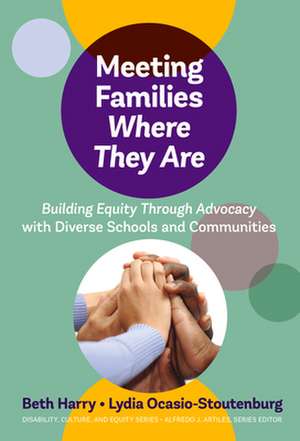Meeting Families Where They Are
Autor Beth Harry, Lydia Ocasio-Stoutenburg Editat de Alfredo J Artilesen Limba Engleză Paperback – 10 apr 2020
Preț: 256.55 lei
Nou
Puncte Express: 385
Preț estimativ în valută:
49.09€ • 52.50$ • 40.93£
49.09€ • 52.50$ • 40.93£
Carte disponibilă
Livrare economică 27 martie-10 aprilie
Preluare comenzi: 021 569.72.76
Specificații
ISBN-13: 9780807763841
ISBN-10: 0807763845
Pagini: 192
Dimensiuni: 152 x 226 x 10 mm
Greutate: 0.27 kg
Editura: Teachers College Press
ISBN-10: 0807763845
Pagini: 192
Dimensiuni: 152 x 226 x 10 mm
Greutate: 0.27 kg
Editura: Teachers College Press
Notă biografică
Beth Harry is a professor of special education and chair of the Department of Teaching and Learning at the University of Miami, and coauthor of Why Are So Many Minority Students in Special Education? Second Edition. Lydia Ocasio-Stoutenburg is a doctoral candidate at the University of Miami.
Descriere
Presents a discussion of how human disability and parental advocacy have been constructed in American society, including recommendations for a more authentically inclusive vision of parental advocacy. The authors provide a cultural-historical view of the conflation of racism, classism, and ableism that have left a deeply entrenched stigma.
